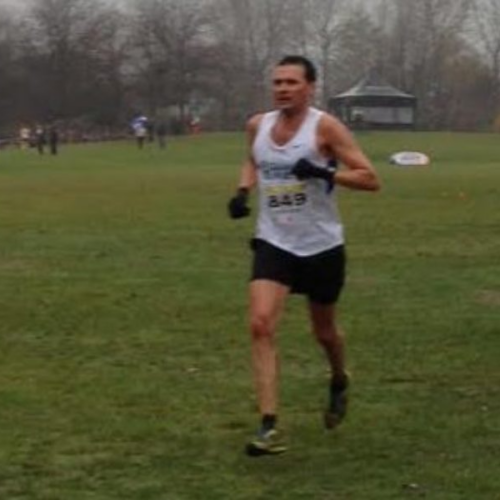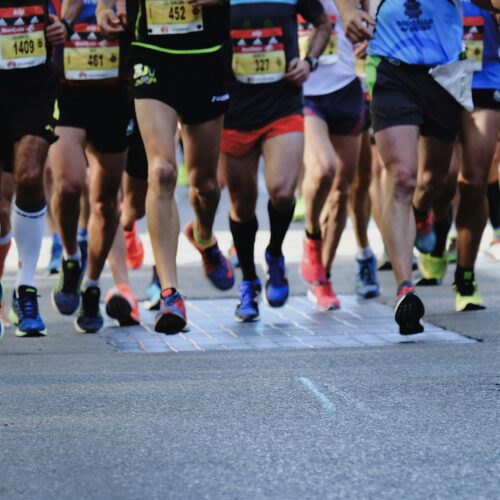The Great Trek Training Suggestions
Published on September 29, 2020
The Great Trek is two months away. You have time to improve your fitness and have a good race. I suggest you follow a program running three times per week, which reduces the risk of injury and is more time efficient. Running three times per week emphasizes quality over quantity, and event specific training through occasional long runs at race pace.
Each week there are three basic types of training that are completed on three separate days. The three key workouts are designed to improve the three primary indicators of performance.
The three primary indicators of performance:
1) Aerobic Capacity – VO2 Max;
2) Lactate Threshold – Aerobic/Anaerobic Threshold change speed; and,
3) Economy – Economical use of oxygen and running technique.
The three key workouts are:
1) Speedwork Intervals – run very fast at 10km race pace or faster (improves Aerobic Capacity – VO2 Max, and Running Economy);
2) Tempo and Steady State Runs – usually marathon race to 15km race pace (improves Lactate Threshold and Aerobic Threshold); and,
3) Saturday Aerobic Runs –
a) Long Easy Aerobic Endurance Runs – 20 to 45 seconds per km slower than half and full marathon race pace (improves Aerobic Threshold).
b) Long Easy Aerobic Endurance Runs with Aerobic Threshold – 2km to 4km pace pick-ups at marathon goal pace – Saturday’s long easy run is at a slow pace with intermittent stops, but aerobic threshold tempos are included in the schedule from time to time.
You can add a fourth easy pace day. But if you want to train more than three times per week I suggest adding easy effort cross-training workouts to build a stronger aerobic base rather than running extra distance at a slow pace. Cross training should be aerobic. Overly intense workouts, like spin class, leave you fatigued for key runs. I suggest pool running, stationary biking and elliptical as the best forms of cross-training. You can cross train 45 min to 60 min 3 times per week as a safe way to build fitness.
The Great Trek offers the 5km, 10km and Half Marathon in person and virtual events. You can run all three distances to earn the hat trick award. If you are running marathon(s) in 2024 it could be several months before you need to complete a long run over 25km. You may want to consider staying fit without running too many miles per week. An effective way to keep fit and ready to jump into long distance training is by following a multi pace running program that covers all the running zones; easy pace, aerobic threshold, anaerobic threshold, VO2 max and speed.
Build a training schedule:
A multi pace program considers all paces and keeps you fit for racing all distances from 5km to the marathon. Try running six paces every two weeks. The six paces are: 5km pace, 10km pace, 15km pace and half marathons pace, marathon pace and easy pace. Every two weeks you will have run each of these paces at least one time.
Here is an example of a two week cycle that includes all six paces:
| WEEK OF | MONDAY | WEDNESDAY | SATURDAY | |
| Tempo Workouts | Speed, Intervals, Hills | Aerobic Endurance | ||
| Week 1 | 3x10min (Half marathon pace) | PYRAMID INTERVALS | 2,3,4,5,4,3min(10km pace)[1min rest] | 12km including 3 x 1600m (Marathon Pace) |
| Week 2 | 6x4min (Tempo/15km pace) | SHORT INTERVALS | 8 to 10 x 2min (5km pace) [2min rest] | 15km to 30km easy pace |
The two week cycle week program provides a good balance in your running and prevents your fitness and speed from slipping while waiting for races to resume. The high speed workouts are the most effective in improving fitness while the longer runs maintain your fitness for longer races. The 5km pace work helps with VO2 Max, while the 10km paces and tempo paces improves lactate threshold. Marathon pace workouts improve the aerobic threshold which is the foundation to build your fitness. The weekly mileage is not excessive to reduce the risk of injury.
Pacing Workouts with Your Mile Time Trial and Running Equivalency Tables
If you are not sure of your paces you can run a mile time trial and your mile time to estimate your paces for your workouts. There is a strong correlation between race times for different distances. For example a 23:00 5km runner has an equivalent level of race time as a 3:45 marathoner and a 6:40 miler. This holds fairly true for all distances from a marathon to 1500m. You can use race results from one event to help you pace your workouts.
My running workout schedules are primarily made of six paces: Easy pace; Marathon pace; Half marathon pace; Tempo pace; 10km pace; and 5km pace.
For example:
A) Wednesday’s workout is 3x{3,2,1min}(5 km pace)[2min rest]. The workout is run at 5km pace and you have a 2.5km warm-up and warm-down at Easy pace. The warm-up at Easy pace is usually Marathon pace plus 30 to 60 seconds per km.
B) Monday’s workout is 3x10min(Half Marathon pace). The workout is 3 repeats of 10 minutes run at Half Marathon pace.
If you know your paces you can run your workout on your own or with a few others.
You can use one or two races to help you establish your paces for workouts using a running equivalency table. A running equivalency table predicts your race time for one event based on the time of another event. For example it can predict how fast you can run a 5km based on your 10km time.
Running tables are not a 100 percent accurate prediction but a guide. There will be some differences depending on how you are training. Event specific training will have an impact on your paces as you may be more fit for one event compared to the other. A speed workout of 10 x 200m will have a greater impact on your 5km time compared to your marathon time. If you train to run your best 5km and do not run any long runs over 15km your marathon time will be at a lower level. The same is true for the reverse. If you only run long easy pace runs your 5km may not be at the same level as your marathon.
When you use the pace tables as a guide you can set up a range for your pace rather than running the exact pace. Your 10km race time fits in the middle of the table and is a good starting point if you have a 10km race time to use. Right now there are no races, so you can use a one mile time trial time as a starting point to pace your workouts.
Using the table below if you run a 8 minute mile your predicted 5km is 27:43, 10km 57:33, 15km 1:29, Half 2:08, and Marathon 4:30. This is a good starting point as you now have all of your paces for workouts. The paces for an 8 minute mile are: 1 mile 4:57 per km, 5km 5:32 per km, 10km 5:45 per km, Tempo/15km 5:55 per km, Half 6:05 per km, Full 6:24 per km.
Once you find your paces, you may choose a plus or minus 10 second pace zone. If your 10km pace is 5 min per km for workouts you can run a 4:50 to 5:10 pace zone. It is not easy to run exactly at a 5 min per km pace. There will be variation of speed which is why a pace zone is more practical. Also you may feel better on some days compared to others. When you are tired, slow it down a bit and when you feel better run at a slightly faster pace. A plus or minus 10 seconds per km is a good pace window for each pace zone: 1mile pace plus or minus 10 sec, 5km +- 10 sec, 10km +- 10 sec, Tempo +- 10 sec, Half +- 10 sec, and Full +- 10 sec.
PACE EQUIVALENCY TABLE
| RACE or TIME TRIAL TIMES | |||||||||
| 1 Mile equivalent | 10:38 | 9:45 | 8:52 | 7:59 | 7:05 | 6:40 | 6:12 | 5:45 | 5:19 |
| MARATHON Equivalent | 6:00 | 5:30 | 5:00 | 4:30 | 4:00 | 3:45 | 3:30 | 3:15 | 3:00 |
| HALF Equivalent | 2:51 | 2:37 | 2:22 | 2:08 | 1:54 | 1:47 | 1:40 | 1:32 | 1:25 |
| 15km Equivalent | 1:59 | 1:49 | 1:39 | 1:29 | 1:19 | 1:14 | 1:09 | 1:04 | 59:30 |
| 10km Equivalent | 77:00 | 70:20 | 64:00 | 57:33 | 51:09 | 48:00 | 44:45 | 41:34 | 38:22 |
| 5km Equivalent | 37:00 | 33:52 | 30:47 | 27:43 | 24:38 | 23:00 | 21:30 | 20:01 | 18:28 |
| PACES | |||||||||
| 1 Mile Pace per km | 6:35 | 6:03 | 5:30 | 4:57 | 4:24 | 4:08 | 3:50 | 3:33 | 3:18 |
| Marathon Pace per km | 8:30 | 7:49 | 7:05 | 6:24 | 5:41 | 5:19 | 4:58 | 4:37 | 4:16 |
| Half Pace per km | 8:05 | 7:26 | 6:44 | 6:05 | 5:24 | 5:04 | 4:43 | 4:23 | 4:03 |
| 15km Pace per km | 7:56 | 7:16 | 6:35 | 5:55 | 5:16 | 4:56 | 4:36 | 4:16 | 3:57 |
| 10km Pace per km | 7:41 | 7:01 | 6:22 | 5:45 | 5:06 | 4:47 | 4:28 | 4:09 | 3:49 |
| 5km Pace per km | 7:24 | 6:46 | 6:09 | 5:32 | 4:55 | 4:37 | 4:18 | 3:59 | 3:41 |
—



